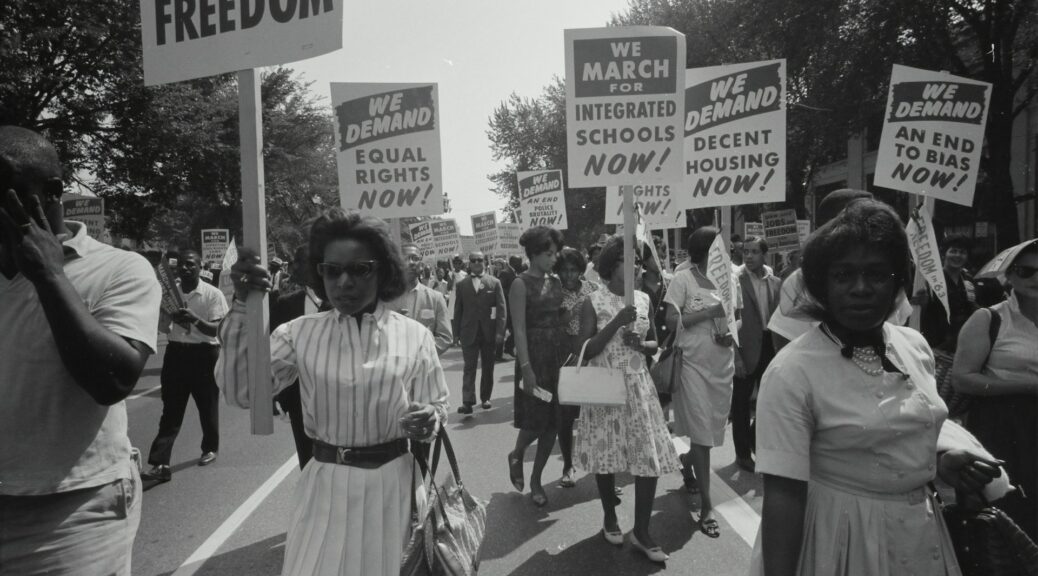Some people are just made to cause, as the late Congressman John Lewis called it, “good trouble.” They’re contrarian by nature. It’s in their DNA. It ignites their fury. It explains their courage to put life and limb at risk for what they believe in.
Which brings us to African American History Month 2024 and to “Mrs. Good Trouble” herself, the late civil rights pioneer Amelia Boynton Robinson, inarguably the matriarch of the voting rights movement. Now if you subscribe to that familiar saying, “behind every great man is a woman,” then I’ll say, “behind every great movement is a woman.” Many of them in fact.
Research deep enough and you’ll come across a grainy old black and white photo of Boynton Robinson at the foot of Selma’s Edmund Pettus bridge cradled in the arms of a fellow marcher after being viciously beaten on “Bloody Sunday” in 1965. Another photograph will show her lying barely conscious on the ground with a white police officer standing over her, nightstick in hand.
Go ahead, we’ll wait and understand if you found those images so disturbing that a return to the rest of this narrative would deepen your chagrin.
Let’s now fast forward to 50 years later, to a colorful 2015 picture of a wheelchair bound Mrs. Boynton next to President Barack Obama and John Lewis ironically at the foot of that infamous Edmund Pettus bridge and, later, having a congressional medal of honor placed around her neck by President Obama.
Now as I confessed at the outset of my last one about the late Reverend James Reeb who was assassinated in Selma, Boynton’s contributions are the stuff for volumes, not the limitations of space in this narrative. That said, here’s an abbreviated look at her life.
Amelia Boynton Robinson was born in 1911 in Savannah, Georgia. In an era where literacy tests were used to discriminate against African Americans seeking to vote, Robinson used her status as a registered voter to assist other African Americans to become registered voters. She spent her first two years of college at Georgia State College (now Savannah State University), then transferred to Tuskegee Institute in Alabama. She graduated from Tuskegee before further furthering her education at Tennessee State, Virginia State and Temple Universities.
In 1930, while working as a teacher Robinson met Sam Boynton, who she knew while studying at Tuskegee Institute. They married and began to work together to bring education, a higher standard of living, and voting rights to the African American poor, most of whom were sharecroppers.
In 1964, Robinson became the first African American woman ever to seek a seat in Congress from Alabama and won ten percent of the vote when only five percent of the registered voters were African American. That year she asked Dr. Martin Luther King, Jr. to come to Selma and help promote the cause. Soon after, he and the SCLC set up their headquarters at Boynton’s Selma home where they planned the Selma to Montgomery March of March 7, 1965.
In 1965, Robinson was one of the civil rights leaders that led the famous first march across the Edmund Pettus Bridge which resulted in what became known as “Bloody Sunday.” She was gassed and beaten and left for dead, an image of which helped to spark an outpouring of support for the Civil Rights Movement.
Forever the activist, in 1992 Robinson co-founded the International Civil Rights Solidarity Movement, and received worldwide recognition for her service to humanity. In 2005, Robinson and her late husband Sam Boynton were honored on the Fortieth Anniversary of Bloody Sunday in Selma. She spent the latter part of her career touring the nation and worldwide, speaking on the behalf of the Schiller Institute to promote civil and human rights.
In 1990, Boynton Robinson was awarded the Martin Luther King Jr. Medal of Freedom. She continued to tour the United States on behalf of the Schiller Institute, which describes its mission as “working around the world to defend the rights of all humanity to progress — material, moral and intellectual,” until 2009.
In 2014, a new generation learned about Boynton Robinson’s contributions from the Oscar-nominated film Selma, a historical drama about the 1965 voting rights marches. A year later, Boynton was honored as a special guest at President Barack Obama‘s State of the Union address.
At the age of 103, Boynton Robinson held hands with President Obama as they marched alongside fellow civil rights activist Congressman John Lewis across the Edmund Pettus Bridge to mark the 50th anniversary of the Selma to Montgomery march.
Boynton died on August 26, 2015, at the age of 104. Her son Bruce Boynton said of his mother’s commitment to civil rights: “The truth of it is that was her entire life. That’s what she was completely taken with. She was a loving person, very supportive — but civil rights was her life.”
So, looking ahead to the next national election, arguably the most consequential one in recent memory, as you are about to cast your vote, do so with the contributions of “Mrs. Good Trouble” and untold others in the front of your mind.
“It is important that young people know about struggles we faced to get to the point we are today. Only then will they appreciate the hard-worn freedom of blacks in this country.” – Amelia Boynton Robinson
Photo by Library of Congress on Unsplash
- The Deion Effect: Part Two – by Terry Howard - April 30, 2024
- The Deion Effect: Part One – by Terry Howard - April 25, 2024
- Again, cutting off one’s nose to spite one’s face – by Terry Howard - April 7, 2024

